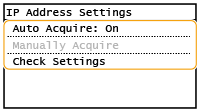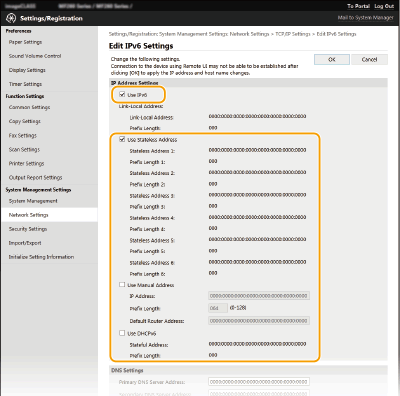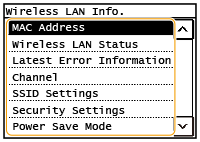Solusi
Connecting the machine to a network requires a unique network IP address. Two versions of IP addresses are available: IPv4 and IPv6. Configure these settings depending on the network environment. To use IPv6 addresses, you need to properly configure the IPv4 address settings.
The machine's IPv4 address can be either assigned automatically by a dynamic IP addressing protocol, such as DHCP, or entered manually. When connecting the machine to a wired LAN, make sure that the connectors of the LAN cable are firmly inserted into the ports. For details, see the "User's Guide" from the Canon website (canon.com/oip-manual). You can test the network connection if necessary.

Setting IPv4 Address
1. Display the <Menu> screen.

Touch Panel Model
Select <Menu> in the Home screen.

5 Lines LCD Model
Press

.
2. Select <Network Settings>.
- If the screen for entering a PIN appears, enter the correct PIN. For details, see the "User's Guide" from the Canon website (canon.com/oip-manual).
3. Select <TCP/IP Settings>

<IPv4 Settings>

<IP Address Settings>.
4. Configure IP address settings.
<Auto Acquire>
Select to automatically assign an IP address via DHCP protocol. When <On> is displayed, automatic addressing is enabled.
<Manually Acquire>
Select to configure the IP address settings by manually entering an IP address. In order to select this option, the automatic acquirement must be set to <Off>.
<Check Settings>
Select when you want to view the current IP address settings.

4-A. Automatically assigning an IP address
4-A-1. Select <Auto Acquire>.
4-A-2. Select the protocol.
- Select <Select Protocol>


 <DHCP>.
<DHCP>.
NOTE
If you do not want to use DHCP/BOOTP/RARP to assign an IP address
- Select <Off>. If you select <DHCP> when these services are unavailable, the machine will waste time and communication resources searching the network for these services.
4-A-3. Check that <Auto IP> is set to <On>.
- If <Off> is selected, change the setting to <On>.
4-A-4. Select <Apply>.
NOTE
- IP addresses assigned via DHCP override the address obtained via Auto IP.

4-B. Manually entering an IP address
4-B-1. Configure a setting to disable auto-acquisition.
- Select <Auto Acquire>, and set both <Select Protocol> and <Auto IP> to <Off>.
4-B-2. Select <Manually Acquire>.
4-B-3. Specify the IP address, subnet mask, and gateway address (or default gateway).
- Enter these values in each screen, and select <Apply>.
- On how to enter text, see the "User's Guide" from the Canon website (canon.com/oip-manual).
NOTE
Checking whether the settings are correct
- Make sure that the Remote UI screen can be displayed with your computer. If a computer is not available, you can check the connection by using the operation panel. For details, see the "User's Guide" from the Canon website (canon.com/oip-manual).
When you have changed the IP address after installing the printer driver
- When the MFNP port is used, the connection is maintained as long as the machine and the computer belong to the same subnet; therefore, you do not need to add a new port. When the standard TCP/IP port is used, you need to add a new port. For details, see the "User's Guide" from the Canon website (canon.com/oip-manual).
*If you do not know which port is used, see the "User's Guide" from the Canon website (canon.com/oip-manual).

Testing the Network Connection
1. Display the <Menu> screen.

Touch Panel Model
Select <Menu> in the Home screen.

5 Lines LCD Model
Press

.
2. Select <Network Settings>.
- If the screen for entering a PIN appears, enter the correct PIN. For details, see the "User's Guide" from the Canon website (canon.com/oip-manual).
3. Select <TCP/IP Settings>

<IPv4 Settings>

<PING Command>.
4. Enter the IPv4 address of another device on the network, and select <Apply>.

If a proper connection has been established, <Received response from host.> is displayed.
The IPv6 addresses of the machine can be configured via the Remote UI. Before setting IPv6 addresses, check the IPv4 address settings. You need to set the correct IPv4 settings to use IPv6 addresses. Note that the scan function that uses the scanner driver or MF Scan Utility is not available in an IPv6 environment. The machine can use the following multiple IPv6 addresses:
| Type | Description |
| Link-local address | An address that is only valid within a subnet or link and cannot be used to communicate with devices beyond a router. A link-local address is automatically set when the IPv6 function of the machine is enabled. |
| Manual address | An address that is entered manually. When using this address, specify the prefix length and default router address. |
| Stateless address | An address that is generated automatically using the MAC address of the machine and the network prefix that is advertised by the router. |
| Stateful address | An address obtained from a DHCP server using DHCPv6.
|
NOTE
- For more information about the basic operations to be performed when setting the machine from the Remote UI, see the "User's Guide" from the Canon website (canon.com/oip-manual).
1. Start the Remote UI and log in to System Manager Mode.
2. Click [Settings/Registration] on the Portal page.
3. Select [Network Settings]

[TCP/IP Settings].
4. Click [Edit] in [IPv6 Settings].
5. Select the [Use IPv6] check box and configure the required settings.
[Use IPv6]
Select the check box to enable IPv6 on the machine. When not using IPv6, clear the check box.
[Use Stateless Address]
Select the check box when using a stateless address. When not using a stateless address, clear the check box.
[Use Manual Address]
When you want to manually enter an IPv6 address, select the check box and enter the IP address, prefix length, and default router address in the corresponding text boxes.
[IP Address]
Enter an IPv6 address. Addresses that start with "ff" (or multicast address) and the loopback address (::1) cannot be entered.
[Prefix Length]
Enter a number that indicates how many bits are available for the network address.
[Default Router Address]
Specify the IPv6 address of the default router as necessary. Addresses that start with "ff" (or multicast address) and the loopback address (::1) cannot be entered.
[Use DHCPv6]
Select the check box when using a stateful address. When not using DHCPv6, clear the check box.
NOTE
Checking whether the settings are correct
- Make sure that the Remote UI screen can be displayed with your computer by using the IPv6 address of the machine. For details, see the "User's Guide" from the Canon website (canon.com/oip-manual).
Selecting settings from the operation panel
- IPv6 settings can also be accessed from the <Menu> screen. For details, see the "User's Guide" from the Canon website (canon.com/oip-manual).
When you have changed the IP address after installing the printer driver
- You need to add a new port. For details, see the "User's Guide" from the Canon website (canon.com/oip-manual).
NOTE
- The IP address is not correctly configured if it is displayed as "0.0.0.0".
- Connecting the machine to a switching hub or bridge may result in a connection failure even when the IP address is correctly configured. This problem can be solved by setting a certain interval before the machine starts communicating. For details, see the "User's Guide" from the Canon website (canon.com/oip-manual).
- You can print a list of the current network settings.
 Printing Reports and Lists
Printing Reports and Lists

Viewing IPv4 Settings



<Network Information>

<IPv4>

Select the setting to view

Check the settings

Viewing IPv6 Settings



<Network Information>

<IPv6>

Select the setting to view

Check the settings

Viewing Direct Connection Information

Viewing the MAC Address for Wired LAN
1. Display the <Menu> screen.

Touch Panel Model
Select <Menu> in the Home screen.

5 Lines LCD Model
Press

.
2. Select <Network Settings>.
- If the screen for entering a PIN appears, enter the correct PIN. For details, see the "User's Guide" from the Canon website (canon.com/oip-manual).
3. Select <Ethernet Driver Settings>.

MAC address is displayed.

Viewing the MAC Address and Information for Wireless LAN
1. Display the <Menu> screen.

Touch Panel Model
Select <Menu> in the Home screen.

5 Lines LCD Model
Press

.
2. Select <Network Settings>.
- If the screen for entering a PIN appears, enter the correct PIN. For details, see the "User's Guide" from the Canon website (canon.com/oip-manual).
3. Select <Wireless LAN Settings>.
- If the <Do you want to enable the wireless LAN?>/<Enable the wireless LAN?> message is displayed, select <Yes>.
- If the <Direct Connection will be terminated. Is it OK?> message is displayed, select <Yes>.
4. Read the message that is displayed, and select <OK>.
5. Select <Wireless LAN Information>.
6. Select the setting to view.
NOTE
Viewing security information
- To view WEP and WPA/WPA2-PSK information, use the following procedure.
Viewing from the <Status Monitor> screen
- <Wireless LAN Status> and <Latest Error Information> can be viewed from
 .
.
 Setting IPv4 Address
Setting IPv4 Address Touch Panel Model
Touch Panel Model 5 Lines LCD Model
5 Lines LCD Model .
. <IPv4 Settings>
<IPv4 Settings>  <IP Address Settings>.
<IP Address Settings>.
 4-A. Automatically assigning an IP address
4-A. Automatically assigning an IP address

 <DHCP>.
<DHCP>. 4-B. Manually entering an IP address
4-B. Manually entering an IP address Testing the Network Connection
Testing the Network Connection Touch Panel Model
Touch Panel Model 5 Lines LCD Model
5 Lines LCD Model .
. <IPv4 Settings>
<IPv4 Settings>  <PING Command>.
<PING Command>. If a proper connection has been established, <Received response from host.> is displayed.
If a proper connection has been established, <Received response from host.> is displayed. [TCP/IP Settings].
[TCP/IP Settings].
 Printing Reports and Lists
Printing Reports and Lists
 Viewing IPv4 Settings
Viewing IPv4 Settings

 <Network Information>
<Network Information>  <IPv4>
<IPv4>  Select the setting to view
Select the setting to view  Check the settings
Check the settings Viewing IPv6 Settings
Viewing IPv6 Settings

 <Network Information>
<Network Information>  <IPv6>
<IPv6>  Select the setting to view
Select the setting to view  Check the settings
Check the settings Viewing Direct Connection Information
Viewing Direct Connection Information


 <Network Information>
<Network Information>

 <Direct Connection Information>
<Direct Connection Information>

 <Connection Details>
<Connection Details>

 Check the settings
Check the settings Viewing the MAC Address for Wired LAN
Viewing the MAC Address for Wired LAN Touch Panel Model
Touch Panel Model 5 Lines LCD Model
5 Lines LCD Model .
. MAC address is displayed.
MAC address is displayed. Viewing the MAC Address and Information for Wireless LAN
Viewing the MAC Address and Information for Wireless LAN Touch Panel Model
Touch Panel Model 5 Lines LCD Model
5 Lines LCD Model .
.


 Select the displayed security protocol
Select the displayed security protocol

 Select the setting to view
Select the setting to view .
.

 <Network Information>
<Network Information>  <Network Connection Method>
<Network Connection Method>

 <Conn. Info>/<Connection Information>
<Conn. Info>/<Connection Information>  Select the setting to view
Select the setting to view